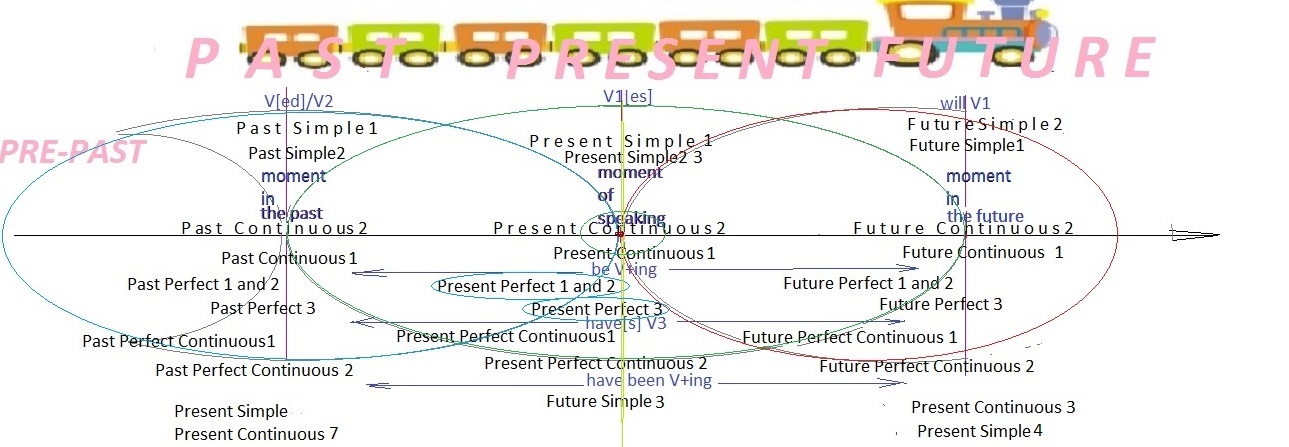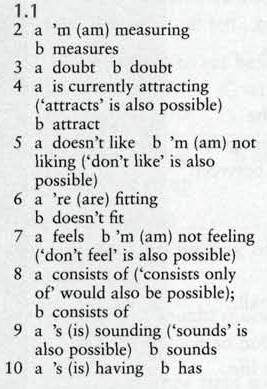Present Simple vs Present Continuous
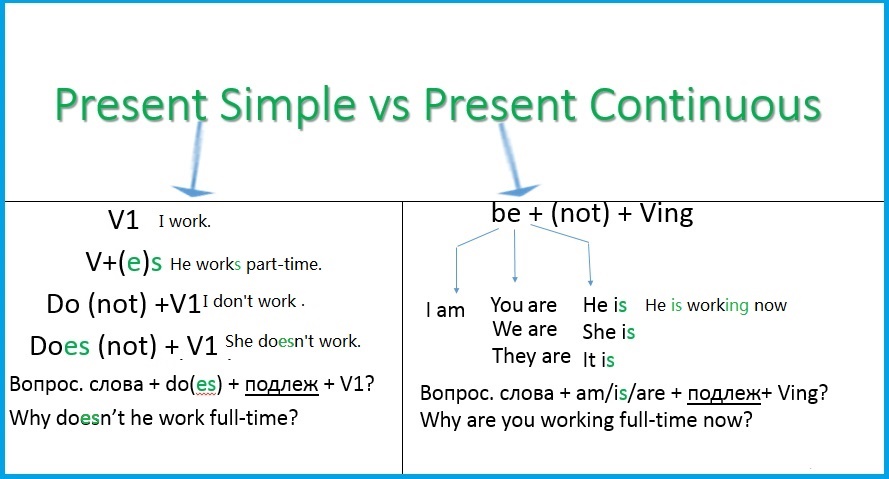
Basic principle
Continuous is for permanent, regular actions or characteristics, which are not going to change
Simple is for temporary actions or characteristics, happening now or around now.
Present Simple
1.Actions happening always, typically. This routine is not going to stop, the characteristic is inherent in the subject.
occupation interests traditions characteristics
He works in a big company ( and it is going to be like this for quite a long time)
2.Actions happening regularly, with a certain frequency.
I usually check my e-mail on coming to work.
We have a vacation 2 times a year.
3.Dogmas and rules
Earth goes round the Sun
Cats eat mice
4. Public timetables [the future meaning]
The train leaves at 10.00.
We play at Wimbledon on Saturday.(=It has been agreed with the public and the press)
5. Forecasts based on input data. (Usually weather forecasts, economic forecasts)
It will rain tomorrow.
The price of real estate will grow during these 2 years.
I think/suspect/it will be better soon.
5. Dramatic narrative. =драматическое повествование [the past meaning]
Once I come home and see that the door is open and there is no TV-set. = Однажды прихожу я домой и вижу….
6. Comments on something happenicheckg very dynamically at the time of speaking. Usually in sports.
Beckham passes the ball to Zedan. Zedan sends it into the goal!
7. In time and conditional clauses [придаточные] referring to the future. =В придаточных условия и времени, относящихся к будущему.
If I am in your city, I will swing by.
When granny cooks her pies, I will call you to dinner.
8. With stative words. Such verbs are not used in Continuous!

+ Senses: see, hear, feel, sense
I see an elephant now.
Compare: I am looking at an elephant.
Present Continuous
1.An action or a change going on at the time of speaking
I am writing this presentation now.
The human population is increasing. The temperatures are rising. Теплеет =It is getting. Холодает.
2. An action happening around the time of speaking
This week this year today this summer
I am preparing for my entrance exams this year.
The action may look like one repeated regularly in the present, but you still may want to emphasize that it is temporary.
I am going to the gym every day now to lose weight.
3. A fixed personal plan for the future (usually near future)
I am going to a party tonight.We are buying a house in Italy. ( =We are sure about it)
Attention: Less definite personal plans for the future => be going to V1
We are going to buy a house in Italy ( = We are working on a plan).
Exception: We plan to V1.
We plan to buy a house in Italy.
4. Predictions of something that is about to happen based on some signs =Предсказания чего-то, что вот-вот произойдет, основанные на каких-то знаках.
I don’t remember anything. I am going to fail the exam! ( =Чувствуется, что я сейчас завалю экзамен!)
Look! It is going to rain! There are heavy clouds in the sky.
5. In time clauses referring to a background action in the future / present after while / when =В придаточных времени, относящихся к фоновому действию в будущем.
While I am looking through these papers, you should examine the desk.
6. With actions that happen more often than normal, irritating or surpising us.=С действиями, происходящими чаще, чем это считается нормальным, что нас раздражает или удивляет.
constantly always ever continually forever
He is constantly losing his things! So absent-minded!
This computer is always crashing! It is time to shange it.
7. In drammaric narratives together with Present Simple.
Yesterday I come into her room and she is standing on her head!
6.With stative verbs. Continuous is meant but not used usually! They are those verbs that mean states, not movements or changes.

I respect you now for what you are doing.
Some verbs have both stative and dynamic meanings.
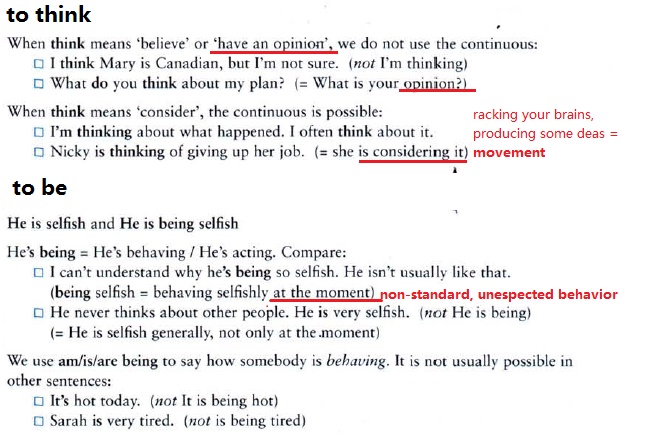
Verbs of senses also have not only stative meanings but also dynamic ones.


to smell a rat= to suspect that something is wrong

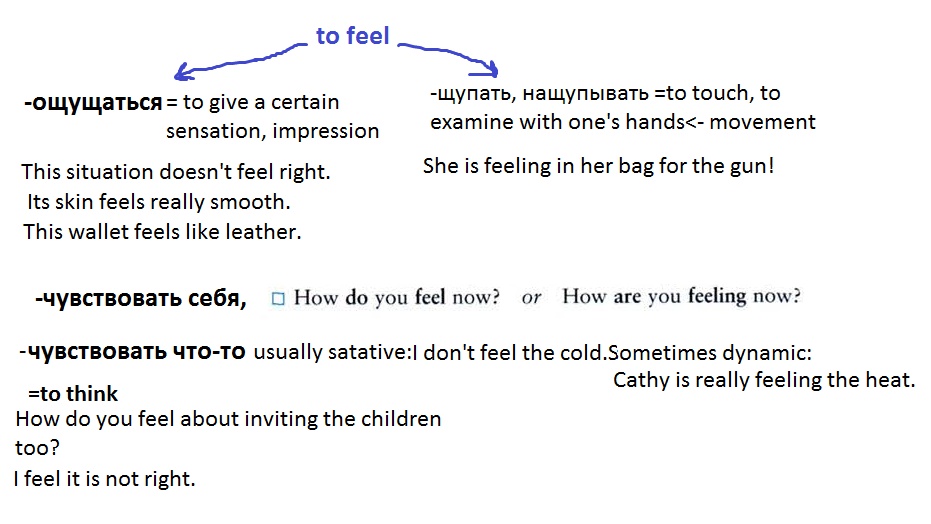


Verbs of mental-verbal activities, called performatives. Mind their negative forms!
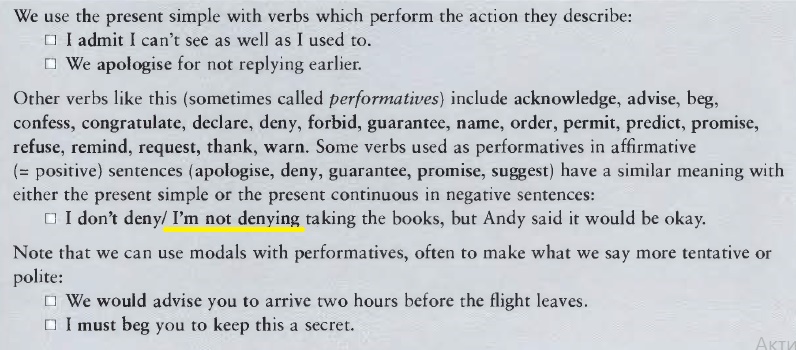
Some more verbs of mental activity
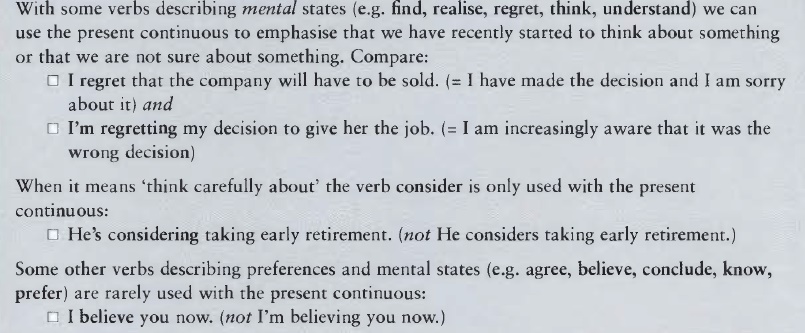
Practice
1. What is an eclipse?
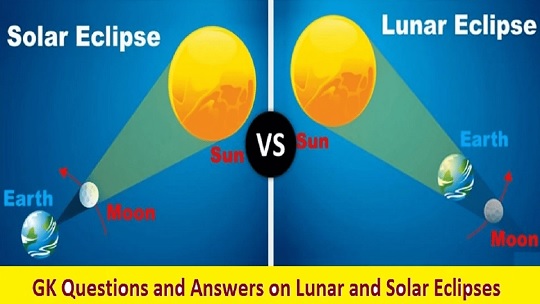 A solar eclipse (1) (happen) happens when the moon (2) (pass) in front of the sun. This only (3) (take) place when there is a new moon. It (4) (last) for up to 7.5 minutes. During a solar eclipse, it is dark. The birds (5) (not sing), and animals (6) (keep) still and quiet. A solar eclipse (7) (not happen) very often, and most people (8) (enjoy) seeing one. However, it’s important not to look straight at the sun. If you (9) (not remember) this, you can damage your eyes.
A solar eclipse (1) (happen) happens when the moon (2) (pass) in front of the sun. This only (3) (take) place when there is a new moon. It (4) (last) for up to 7.5 minutes. During a solar eclipse, it is dark. The birds (5) (not sing), and animals (6) (keep) still and quiet. A solar eclipse (7) (not happen) very often, and most people (8) (enjoy) seeing one. However, it’s important not to look straight at the sun. If you (9) (not remember) this, you can damage your eyes.
A lunar eclipse (10) (occur) when the earth’s shadow (11) (fall) on the moon. The moon (12) (look) dim until it (12) (come) out from the shadow.
Total Questions: 0
Incorrect Answers: 0
2. Choose the right tense. Write a or b in each gap.
A letter from England
Hi, Karen
(1) a.I'm having /b. have a great time here in England. My college term (2) a.isn't starting / b.doesn't start
until next month, so (3) a.I'm taking /b.take the opportunity to earn some money. (4) a. I'm staying /
b.stay with my English friend, Robbie. His parents (5) a.are owning / b.own a software business.
In the evenings (6) a.I'm driving / b.I driveinto London with Robbie to go clubbing. (7) a.I'm making / b.I make a lot of new friends.
(8) a. I think / b. I am thinking my pronunciation is much better than when I arrived, and
(9) a.I'm understanding /b. I understand almost everything now. On weekdays (10) a.I'm helping / b. I help
Robbie's dad. At the moment (11) he a.is working / b.works on a new website and (12) he a.is needing /
b.needs help with it. It's quite tiring work, but (13) a.I'm liking / b.I like* it and (14) a.I'm learning /b. learn
some really useful stuff about the Web.
(15) a.Do you come /b. Are you coming to visit me soon? (16) a.I'm spending /b. I spend the winter holiday
here at Robbie's. His parents (17) a. are wanting / b. want to meet you and there's plenty of space. But you
must bring your warmest clothes. (18) It a.is getting /b. gets very cold here in the winter.
Let me know as soon as (19) you a.are deciding /b. decide. And tell me what (20) you a.are doing /b.do these days.
(21) a.Do you miss me/b.Are you missing me?
Love,
Pedro
Total Questions: 0
Incorrect Answers: 0
* "I am liking it" is also possible if you mean "I am enjoying it / It is a great pleasure to me"
3. Choose the right form of each verb, Present Continuous or Present Simple. Write a or b.
Examples: I (a.plant / b.’m planting ) a cherry-tree. Will you help me? b
How (a. does she keep / b.is she keeping) her children in line? a
He (a. doesn't feel/b. isn't feeling) well. He hasn’t been well for quite a time. a [but b is also possible with "feel"]
1. These things (a.don't belong/b.aren't belonging) to my parents.
2. Look! He (a.comes/b. is coming). I (a.want/b. am wanting) to speak to him.
3. This stream (a.flows /b.is flowing) to the lake at the bottom of the valley.
4. Today the river (a.flows/b.is flowing) much faster than usual.
5. (a. Does it ever rain/b.Is it ever raining) on Madeira?
6. They usually (a.grow/b.are growing) vegetables in their garden, but this year they(a.don't grow/b.aren't growing) any.
7. A: Can you ride a bicycle?
B: No, but I (a.learn/b.am learning). My brother (a.teaches/b.is teaching) me.
8. You can borrow my dictionary. I (a. don't need /b.am not needing) it at the moment.
9. I usually (a.enjoy/b.am enjoying) music but I (a.don't enjoy/b.'m not enjoying) this record very much.
10. I (a. don't believe/b.am not believing) this man’s story.
11. My brother (a.lives/b.is living) in Cardiff. He has always lived in Wales. Where (a.does your sister live/b.is your sister living )?
12. Vladimir is in England now. He (a.stays/b.is staying) with some friends.
13. She (a.looks/b.is looking) for a new flat at the moment.
14. A: What (a.does your husband do/b.is your husband doing)?
B: He’s a broker but he (a. doesn't work/b.isn't working) at the moment.
Total Questions: 0
Incorrect Answers: 0
4. Stative words used in Present Continuous and in Simple
Complete the sentences with the verbs given, using negatives or questions where necessary. Use the same verb for each sentence in the pair. Choose the present continuous if possible; if not, use the present simple. Use ✓ to add any words outside the space and use contracted forms where appropriate, as in 1. (A & B)
Verbs: attract, consist of, doubt, feel, fit, have, like, look, measure, sound
- a. I hear you’re having your house repainted. How ✓ ?
b. I bought this new dress today. How ✓ ? - a. A: What are you doing with that ruler? B: I the area of the kitchen.
b. The garden 12 by 20 metres. - a. I whether I’ll get another chance to retake the exam.
b. I suppose she might be at home tonight, but I it. - a. The new science museum currently 10,000 visitors a month.
b. Flowers bees with their brightly coloured petals. - a. Mike won’t work at the top of the 20-storey building because he heights.
b. A: How’s the new job? B: Well, at the moment, I it at all. - a. My car’s in the garage today. They new brakes.
b. I bought this jumper for Sue, but it her so I’ll have to take it back. - a. What’s your shirt made from? It like silk.
b. I won’t be coming to work today. I very well. - a. The roof of the house only plastic sheets nailed down in a few places.
b. Their school uniform black trousers and a dark green jumper. - a. Simon has been practising the song for days. It quite good, but he doesn’t think he’s ready to perform it in public.
b. A: What’s that noise? B: It like a bird stuck in the chimney. - a. I had a postcard from Joanne on holiday in Spain. It sounds like she a really good time.
b. My sister long blonde hair. You’re bound to recognise her.
Total Questions: 0
Incorrect Answers: 0
V. Найдите ошибку в каждом из следующих предложений и напишите букву, ей соответствующую, в пробел под каждым предложением в любом регистре
- - I'm telling you [a], the city is growing too fast. - And I'm asking [b] you to calm down! Not everyone hates[c] modernizations [d].
Error in:
- There’s more traffics [a] than ever before. - True, but that’s what comes [b] with expansion. Urban areas [c] tend to sprawl if not managed properly [d].
Error in:
- Why are you arguing [a] again? - Because you're never listening [b] to the facts. - That's what I'm meaning [c]. Too emotional! - Then stop accusing [d] me!
Error in:
- Urban sprawl reduces green zones [a], and people end up driving more. - Yes, but many prefer [b] suburbs for the silence. - That’s being [c] a strong argument for families. - Unless they hate commuting [d]!
Error in:
- I'm not denying [a] the drawbacks. But ruralities [b] must evolve too. - Sure, but not at the cost of environment [c] and mental health [d].
Errors in: ,
Error in:
- More roads are being built [a], but congestion remains. - That's because population has doubled [b] in a decade. - Yet, planners seems [c] to ignore the obvious. - Frustrating, isn't it? [d]
Error in:
- Some locals are refusing [a] to relocate. - I’m knowing [b] a family who still lives near the railway tracks. That’s commitment [c]! – Or stubbornness [d]...
Error in:
- What’s wrong with vertical housing [a]? - Not everyone likes heights [b], or living with so many neighbores [c]. - That’s fair. [d]
Error in:
- Honestly, the authorities is [a] trying, but the issue’s massive. - I can see [b] that. - But temporary measures won’t work [c]. - They need a long-term vision [d].
Error in:
- All I’m saying [a] is that urban sprawl isn’t inevitable. - But I'm agree [b] with that. - Really? [c] You're finally listening! - Miracles do happen [d].
Error in:
Total Questions: 0
Incorrect Answers: 0
